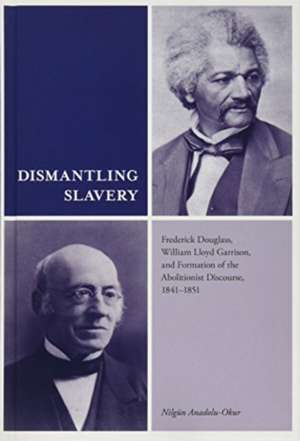Dismantling Slavery: Frederick Douglass, William Lloyd Garrison, and Formation of the Abolitionist Discourse, 1841–1851
Autor Nilgun Anadolu-Okuren Limba Engleză Hardback – 16 dec 2016
—Randall M. Miller, Saint Joseph’s University
In 1841, William Lloyd Garrison and Frederick Douglass formed a partnership that would last a decade and forever change the abolitionist movement. Throughout the stages of their extraordinary alliance, anti-slavery mobilization was accelerated, reaching its height between 1841 and 1851. Centering their arguments on emancipation, women’s equality, and suffrage, the two men worked tirelessly to publicize and recruit for their cause. Their work initiated a new discourse of social reform and critique, positioning the abolition of slavery at the center of progressive social concerns throughout the first half of the nineteenth century.
Dismantling Slavery is the first book to address these two giants of abolition—Douglass and Garrison—simultaneously. While underscoring the evolution of abolitionist discourse, Dismantling Slavery unveils the true nature of the friendship between Douglass and Garrison, a key ingredient often overlooked by scholars. Drawing on the writings, speeches, and experiences that shaped the two as abolitionists, Nilgün Anadolu-Okur’s groundbreaking study is one account of the ways in which abolitionist discourse was shaped and put to the purposes of moral and democratic reforms. In addition to turning a close eye on the relationship between Douglass and Garrison, Anadolu-Okur also details significant developments that occurred in tandem among other abolitionists and activists of the era, making for a compelling account of this pivotal decade in American history, up until the dissolution of Garrison and Douglass’s partnership.
Dismantling Slavery represents a significant interdisciplinary contribution to the study of abolitionist discourse and will appeal to a wide range of nineteenth-century scholars.
NILGÜN ANADOLU-OKUR is an associate professor of African American Studies at Temple University in Philadelphia, where she specializes in African American literature, theater and the history of Underground Railroad. She is the author of Contemporary African American Theater: Afrocentricity in the Works of Amiri Baraka, Larry Neal, and Charles Fuller, and the editor of Essays Interpreting Writings of Novelist Orhan Pamuk and Women, Islam, and Globalization in the Twenty-First Century.
Preț: 415.30 lei
Preț vechi: 563.23 lei
-26% Nou
Puncte Express: 623
Preț estimativ în valută:
79.48€ • 82.10$ • 66.15£
79.48€ • 82.10$ • 66.15£
Carte indisponibilă temporar
Doresc să fiu notificat când acest titlu va fi disponibil:
Se trimite...
Preluare comenzi: 021 569.72.76
Specificații
ISBN-13: 9781621902362
ISBN-10: 1621902366
Pagini: 344
Dimensiuni: 152 x 229 x 28 mm
Greutate: 0.65 kg
Ediția:1st Edition
Editura: University of Tennessee Press
Colecția Univ Tennessee Press
ISBN-10: 1621902366
Pagini: 344
Dimensiuni: 152 x 229 x 28 mm
Greutate: 0.65 kg
Ediția:1st Edition
Editura: University of Tennessee Press
Colecția Univ Tennessee Press
Notă biografică
NILGÜN ANADOLU-OKUR is an associate professor of African American Studies at Temple University in Philadelphia, where she specializes in African American literature, theater and the history of Underground Railroad. She is the author of Contemporary African American Theater: Afrocentricity in the Works of Amiri Baraka, Larry Neal, and Charles Fuller, and the editor of Essays Interpreting Writings of Novelist Orhan Pamuk and Women, Islam, and Globalization in the Twenty-First Century.
Recenzii
"Antebellum discourse—and especially political speech—is given short shrift in African American studies. So Dismantling Slavery is a welcome addition. The clear
and engaging style of this book is suited to both academics and non-academics alike, and the author’s effort to weave literary, political, and social history into one story is
admirable. Douglass and Garrison’s correspondence provides a narrative continuity that would be hard to find otherwise."
—Mark Garrett Longaker, author of Rhetoric and the Republic: Politics, Civic Discourse, and Education in Early America
and engaging style of this book is suited to both academics and non-academics alike, and the author’s effort to weave literary, political, and social history into one story is
admirable. Douglass and Garrison’s correspondence provides a narrative continuity that would be hard to find otherwise."
—Mark Garrett Longaker, author of Rhetoric and the Republic: Politics, Civic Discourse, and Education in Early America
"Dismantling Slavery brings a new approach to bear on the intersecting discourses of not just Garrison and Douglass, but others in the conversational circle of abolitionist speech during the crucial decade between 1841 and 1851. This period was vital in establishing a uniquely American literature, and the potent, recombinant nature of Douglass and Garrison’s ideas in reaction with each other affected the web of interconnections between their contemporaries and their works.”
—Josephine A. McQuail, professor of English, Tennessee Technological University
—Josephine A. McQuail, professor of English, Tennessee Technological University
"In her perceptive and instructive study of abolitionist discourse, Anadolu-Okur revisits the formative ten years of the Frederick Douglass–William Lloyd Garrison collaboration and friendship that did much to shape their abolitionist witness and to encourage a more direct abolitionist rhetorical style among an ever-widening compass of men and women activists and writers in America and England. In Anadolu-Okur’s telling, the rhetorical relationships translated into radical thinking that transcended personal rivalries and reform priorities and transformed abolitionism. Anyone wanting to know the symbiosis of abolitionist style and substance will learn much from Anadolu-Okur’s insights. She shows why words mattered, and still do."
—Randall M. Miller, Saint Joseph’s University
—Randall M. Miller, Saint Joseph’s University
